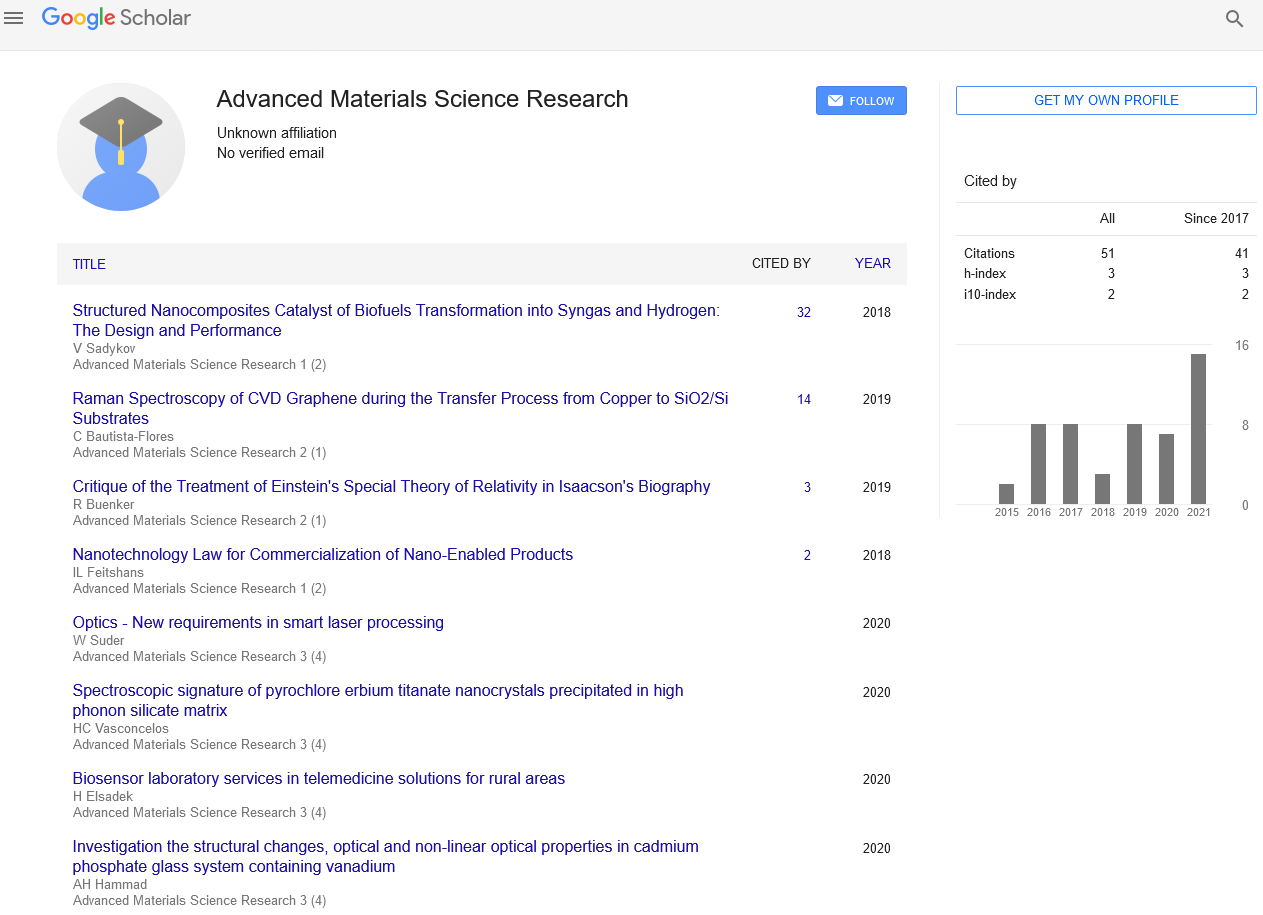Perspective - Advanced Materials Science Research (2024) Volume 7, Issue 6
The Role of Molybdenum in Steel Alloys: Enhancing Performance and Applications
- Corresponding Author:
- Zhiling Feng
Department of Mechanical Engineering,
Peking University,
Beijing,
China
E-mail: Zhiling@ocr.gs
Received: 13-Nov-2024, Manuscript No. AAAMSR-24-152326; Editor assigned: 16-Nov-2024, PreQC No. AAAMSR-24-152326 (PQ); Reviewed: 02-Dec-2024, QC No. AAAMSR-24-152326; Revised: 10-Dec-2024, Manuscript No. AAAMSR-24-152326 (R); Published: 18-Dec-2024, DOI: 10.37532/aaasmr.2024.7(6).233-234
Introduction
Molybdenum, a transition metal with the atomic number 42, plays a crucial role in steel metallurgy. Its unique properties enhance the performance of steel alloys, making them suitable for various demanding applications. This article delves into the significance of molybdenum in steel, exploring its effects on steel properties, its applications and the future of molybdenum steel alloys.
Description
Understanding molybdenum and its properties
Molybdenum is a silvery metal known for its high melting point of 2623°C (4753°F) and excellent resistance to corrosion. It is often used in its pure form or as part of various alloys. In the context of steelmaking, molybdenum is valued for its ability to improve the steel’s strength, toughness and resistance to wear and corrosion.
Atomic structure and properties
Molybdenum has a Body-Centered Cubic (BCC) crystal structure, which contributes to its high melting point and stability at elevated temperatures. This structure allows molybdenum to maintain its mechanical properties even under extreme conditions. Additionally, molybdenum is resistant to oxidation and corrosion, making it ideal for use in harsh environments.
Molybdenum in steel making
The role of molybdenum in steel: In steel making, molybdenum is primarily used as an alloying element. Its primary roles include:
Increasing hardness and strength: Molybdenum enhances the hardness and strength of steel, especially at high temperatures. This is due to its ability to form solid solutions with iron and its impact on the steel’s microstructure.
Improving toughness: Molybdenum contributes to the steel’s toughness, which is essential for resisting impact and deformation. This makes molybdenum-alloyed steels suitable for applications that involve dynamic loads.
Enhancing corrosion resistance: Molybdenum improves the steel’s resistance to corrosion and oxidation, particularly in acidic and chloride-rich environments. This property is crucial for applications in the chemical and marine industries.
Promoting heat resistance: Molybdenum-containing steels maintain their strength and hardness at elevated temperatures, making them suitable for high-temperature applications like turbine blades and heat exchangers.
Types of molybdenum-containing steels
Molybdenum can be added to steel in various forms, leading to different types of molybdenumcontaining steels:
Low-alloy steels: These steels typically contain 0.2% to 0.5% molybdenum. They are used in structural applications where strength and toughness are required, such as in bridges and buildings.
High-alloy steels: These steels have higher concentrations of molybdenum, ranging from 0.5% to 5%. They are used in demanding applications, including high-temperature and corrosion-resistant environments.
Tool steels: Molybdenum is used in tool steels to enhance their hardness, wear resistance, and tempering stability. Tool steels with molybdenum are used for cutting tools, dies and molds.
Applications of molybdenum steels
Molybdenum steels are used in a wide range of applications due to their enhanced properties. Some notable applications include:
Automotive industry: Molybdenum steels are widely used in the automotive industry for components that require high strength and durability. Examples include engine parts, transmission gears and chassis components. The high strength-to-weight ratio of molybdenum steels helps improve fuel efficiency.
Aerospace industry: In aerospace applications, molybdenum steels are used for parts that must withstand extreme temperatures and stresses. These include turbine blades, exhaust systems and structural components. The hightemperature strength and resistance to thermal fatigue make molybdenum steels ideal for these applications.
Energy sector: Molybdenum steels are employed in the energy sector for components exposed to harsh environments, such as oil and gas drilling equipment, nuclear reactors and power plant turbines.
Construction industry: The construction industry benefits from molybdenum steels in structural applications, including beams, columns, and reinforcing bars.
Tooling and manufacturing: Tool steels with molybdenum are used in the manufacturing of cutting tools, dies and molds. Molybdenum’s ability to improve hardness and wear resistance extends the lifespan of these tools and enhances their performance.
Manufacturing processes and challenges
Steelmaking techniques: Molybdenum is added to steel during the steelmaking process, which typically involves either the Basic Oxygen Steelmaking (BOS) or Electric Arc Furnace (EAF) methods. The choice of technique affects the distribution and effectiveness of molybdenum in the final steel product.
Challenges in molybdenum steel production
Several challenges are associated with the production of molybdenum steels:
Cost: Molybdenum is a relatively expensive material, which can increase the cost of steel alloys. This factor must be balanced against the performance benefits it provides.
Uniformity: Ensuring a uniform distribution of molybdenum throughout the steel can be challenging, particularly in large-scale production. Inconsistent distribution can lead to variations in the steel’s properties.
Alloying and compatibility: Molybdenum must be carefully alloyed with other elements to achieve the desired steel properties. Compatibility with other alloying elements and the impact on the steel’s microstructure need to be considered.
Conclusion
Molybdenum plays a pivotal role in enhancing the properties of steel alloys, making them suitable for a wide range of applications. Its ability to improve strength, toughness, corrosion resistance and heat resistance ensures that molybdenum-containing steels remain essential in industries such as automotive, aerospace, energy and construction. As steel making technologies advance and new applications emerge, molybdenum will continue to be a valuable component in the development of high-performance steel alloys. The ongoing research and innovation in molybdenum steels promise to further expand their capabilities and applications in the future.

